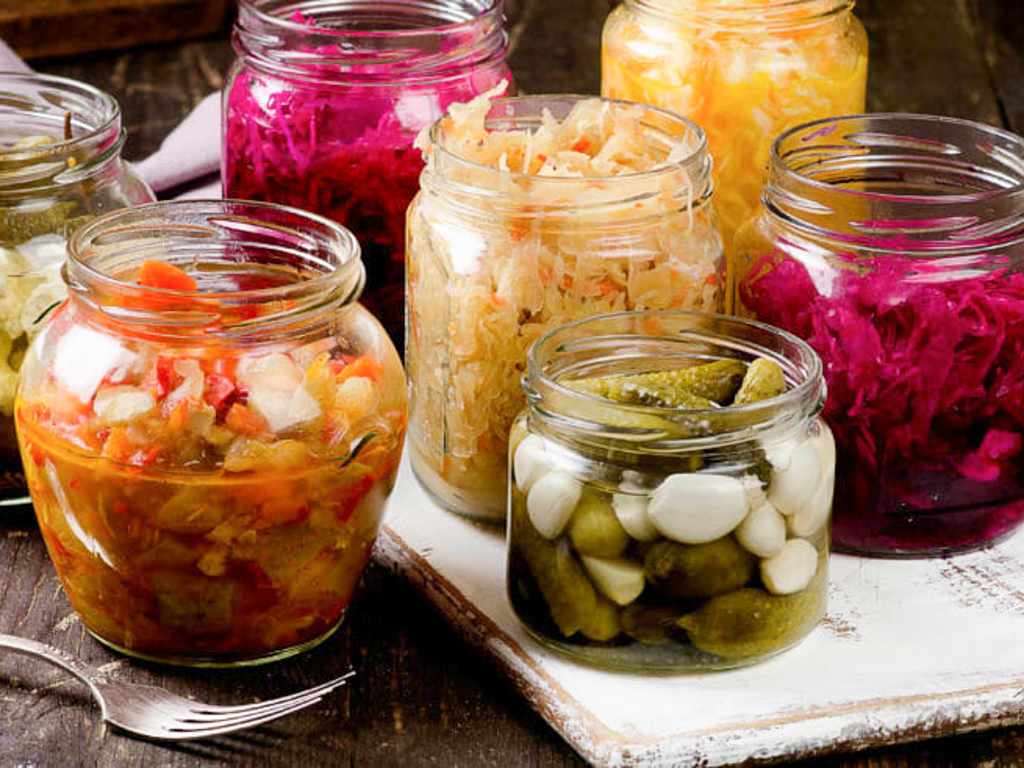5 Mins Read
Ten years ago the terms microbes, gut bacteria and probiotics were not part of most people’s daily vocabulary. Fast forward to 2014, and it feels like barely a week goes by without another big news article about the importance of the over 100 trillion (yes, over 100, 000, 000, 000, 000) bacteria in our gut. The probiotic craze is everywhere. Even going to the veterinarian often results in a prescription for probiotics for our pets.
Most of us not living under a rock know that these zillions of gut bacteria impact how our bodies function. But how do they do so? Why are they important? And how can we make sure to keep them healthy and include them in our daily diet? In the first installment of our new monthly fermenting series, Jacqueline Renee Cohen of LantauMama covers all your questions.
The 411 on Gut Bacteria
As with most aspects of nutritional and medical science, the more we learn, the more we realize we don’t know. We have made strides in the area of gut health but there is still a great deal to learn. The commonplace understanding until recently was that the impact of gut bacteria was mainly limited to the digestive process. We now understand that our view was extremely limited and lacking. The importance of digestion’s role in optimal health in general and gut bacteria’s role in promoting healthy digestion cannot be overstated.
Food intolerances, allergies, auto-immune diseases, increased virus susceptibility, obesity, anxiety, depression- all of these and many more chronic health issues have been found in various medical studies to be linked to the state of a patient’s gut bacteria. The poorer the gut bacteria environment, the poorer the patient’s health. As the newly obsessed media never fails to remind us, we have more neurons in our gut than in the rest of our body (including our brain) combined. This begs the conclusion that biologically and evolutionarily speaking, out gut health is of vital importance.
The Gut Bacteria Crisis
So gut bacteria is important, but what’s the problem exactly? Unfortunately, many of us have the wrong kind of bacteria in our guts or not enough of the good kind, which results in a host of medical issues. As with many of our modern health problems, our industrial foods diet, our pharmaceutical drug glut and our broken agricultural system all play a large part.
Specifics include an over-reliance on antibiotics (the world literally means the opposite of probiotic) for humans and livestock, a diet brimming with processed & fast foods that lack any real nutrition, the significant presence of genetically modified foods and seeds the consequences of which we don’t fully understand, the rampant usage of pesticides on our crops, the mineral and vitamin depletions of our farming soil, and last but not least, a lack of traditionally consumed fermented foods as part of our daily meals.
Our gut bacteria is regularly attacked by our modern lifestyle and has become imbalanced. The good news is there are ways we can help to restore our guts and our overall health as a result. Our gut bacteria needs to be fed properly in order to stay healthy with probiotic-rich foods. Probiotics can be taken in multiple forms whether as a dietary supplement in pill form or by including fermented foods in your diet.
All Probiotics Are Not Created Equal
Fermented Foods: An Overview
Fermentation is not a new concept though it is undoubtedly having its moment on the world food stage. Who doesn’t pickle at home these days? Food fermentation goes back to Neolithic times and as Sandor Katz writes in his book The Art of Fermentation (page 6), fermented foods and drinks “appear to be found in some form in every culinary tradition.” From sauerkraut to pickles to kefir to soya sauce to kombucha to good old yoghurt, the variety of ferments across the world is astonishing. All of these food fermenting techniques are being “rediscovered” with gusto as part of the larger trend to consume traditional foods, eat homemade and choose whole, sustainably-grown and -reared ingredients. As people move away from a more industrial approach to eating and have come to understand that what we eat is one of the most- if not the most- important factors to impact health, the age-old tradition of fermented foods may just be the ticket to optimal health. Obviously homemade ferments are best though there are very good store-bought alternatives too.
What You Need To Know About Probiotic Supplements
In an ideal world, our diets would provide live probiotics from the foods we consume. But it ain’t a perfect world and for those times when life gets a little busy or you are traveling, probiotic supplements are ideal. Some key points to keep in mind:
- Most probiotic pills that are not shelf stable so they lose their potency and effectiveness very quickly- they need to be consumed as soon as they are taken out of the refrigerator.
- Many probiotics brands add the active bacteria strains after pasteurization so if you are the kind of person who prefers your supplements alive and raw, then go for brands whose pills need to be refrigerated.
- A few brands do make shelf stable probiotic pills, but these contain a much smaller number of bacteria strains than the ones that need to be refrigerated.
- Check the ingredients carefully, as many supplements have added sugars or other unwanted additives.
- Those who are vegan and/or dairy-free also need to watch out as many probiotic pills are derived from dairy sources.
In the coming installments, we will be learning about different ferments in Asia, sharing techniques from around the world, and showing you the homemade version you can replicate yourself. Stay tuned!
Lead image courtesy of Off The Grid News







